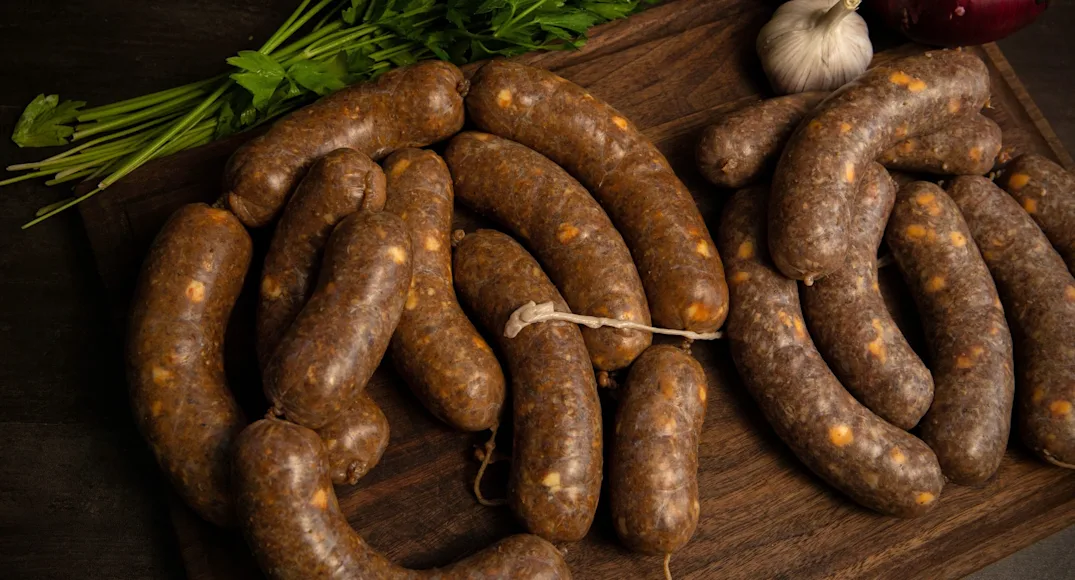It’s that time of year when hunters find themselves sitting on a mound of ground meat trying to figure out how to make venison sausage. You can do a lot with ground venison, from burgers to spaghetti dinners, but with a little time and the right equipment, you can get more creative. Here’s everything you need to know about how to make venison sausage from frozen ground meat.
Equipment for Making Venison Sausage at Home
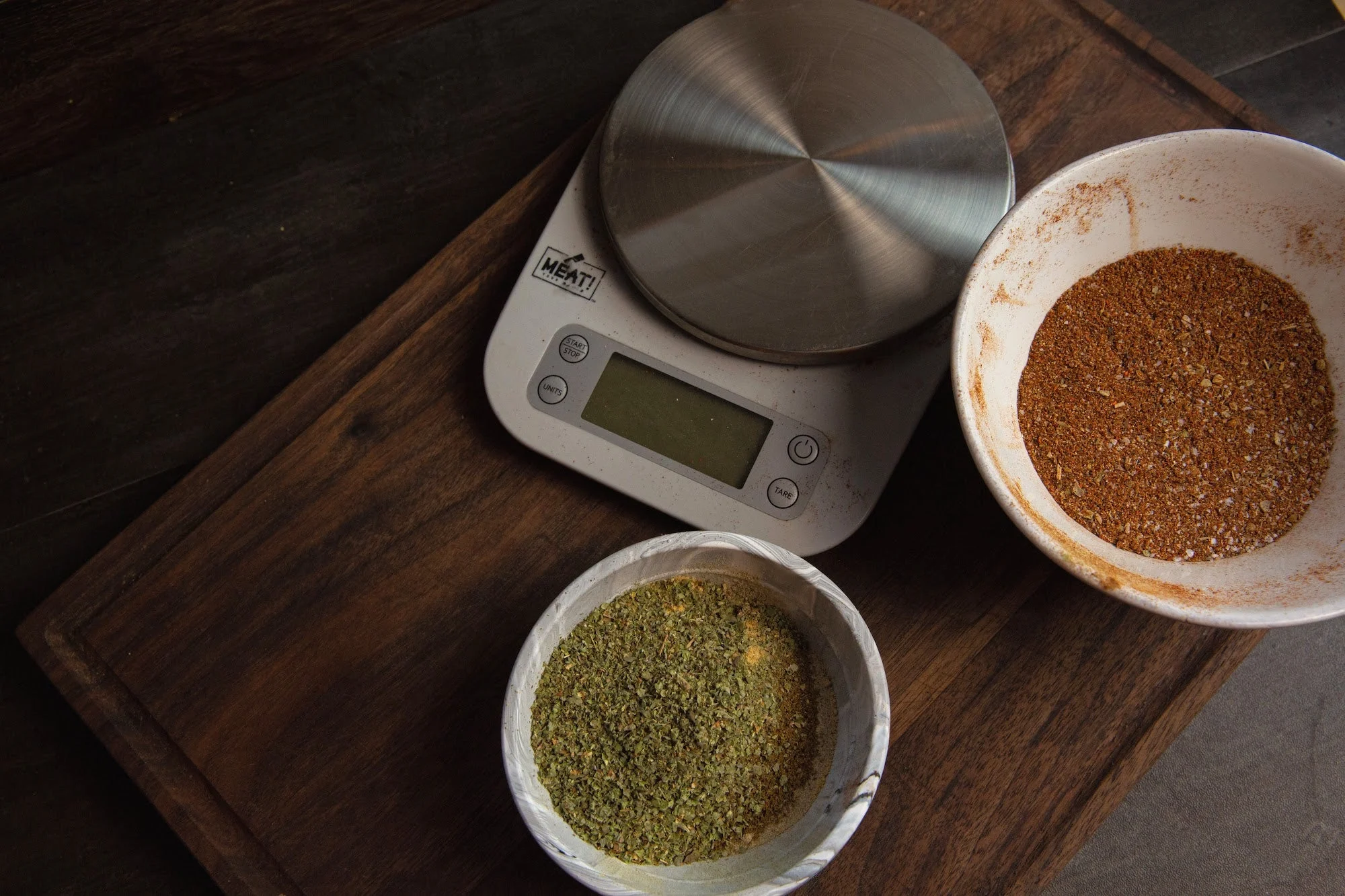
Use a scale for precise measurements. Jack Hennessy
You’ll need some specialized equipment to learn how to make venison sausage. You may already have some of the following at home, but other things—like the sausage stuffer—can be found online or in kitchen stores.
Digital Scales
Learning how to make venison sausage is all about precision, and if you want to be precise, digital scales are the way to go. A standard digital scale can be used to weigh venison. To accurately measure spices, a dry goods scale is best.
Grinder
A grinder
allows you to add pork fatback to ground venison for better texture. Without it, venison sausage tends to be dry. Pork fatback is basically flavorless and lets the flavor of the meat you’re using come through.
Mixer
A meat mixer is optional, but I recommend it to those who want to learn how to make venison sausage in larger batches (think 10 pounds of sausage or more). A mixer will help distribute spices. It also helps break down the protein which, in turn, allows the seasoning, water, meat, and fat to bind together. You can mix by hand, too, but it adds excess heat to the meat which can affect the texture of the finished sausage.
Sausage Stuffer/Press
If you’d like to learn how to make venison sausage links, you’ll need a sausage stuffer/press
. Most grinders include a sausage-stuffing plate and tube attachment, but I don’t recommend using it. A stuffer/press is more efficient and, generally speaking, easier to operate.
If you plan on learning how to make venison sausage patties, you can get away without using any of the equipment above. Instead of grinding pork fatback you can add store-bought ground pork shoulder to ground wild game to make it juicier and more sausage-like. The pork will add its own flavor and texture, which will be a little different than grinding your own fatback, but it works in a pinch.
Tips for Making the Best Venison Sausage
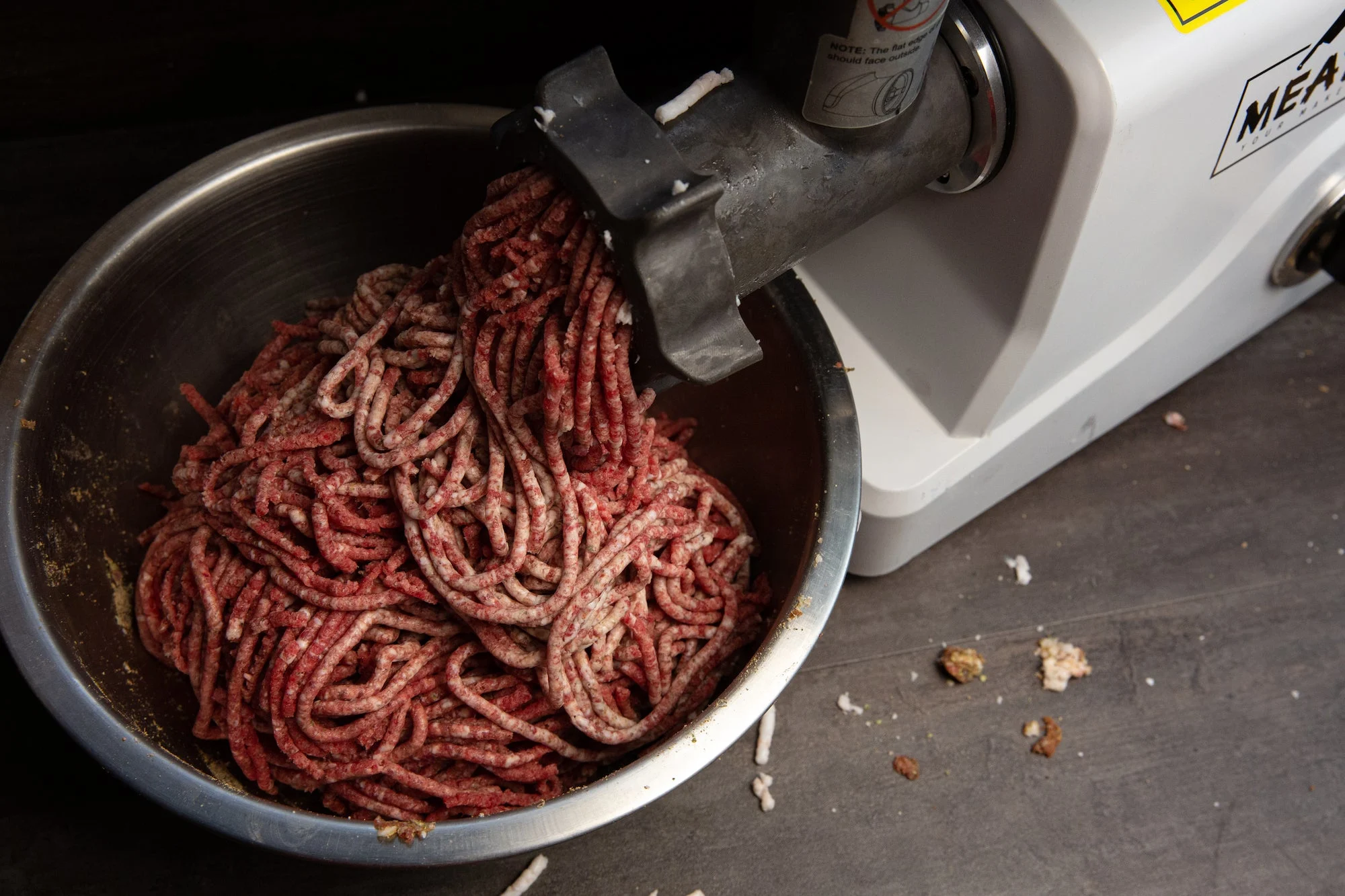
Grind the meat twice. Jack Hennessy
1) Keep the Venison Sausage Meat Ice-Cold at All Times
You want to work with ice-cold, borderline-frozen meat. If the meat warms up, fat can smear, and this fat will leak out during cooking—leaving you with dry, crumbly sausage and crinkly links. If at any point you think the meat is warming up too much, while grinding or mixing, add it back to the freezer for 30 to 60 minutes.
When learning how to make venison sausage from pre-ground game, I suggest thawing out a chub bag of ground meat just enough to cut into four pieces that are small enough to fit in a grinder chute. I also freeze the grinder chute an hour ahead of time. If you’re hand-mixing sausage, the meat should be so cold your elbows start to hurt while mixing.
2) Get Your Fat-to-Meat Ratio Right
Compared to whole muscles, pre-ground venison results in a drier texture after it’s been thawed and cooked. Small muscle fibers (in the form of ground meat) leak more juices after thawing. For that reason, venison sausage made from a frozen package of ground game needs more fat than you’d use when making deer sausage with fresh cuts. I recommend 40 percent pork fatback (by weight) as compared to the 30 to 35 percent used with fresh game. For game meat with a higher fat content, such as waterfowl, I like to add 25 to 30 percent fatback.
If you don’t have a grinder and you’re making venison sausage patties with pre-ground pork, you’ll want to opt for a 1:3 ratio. That’s 3 pounds of ground meat from the freezer to one pound of store-bought ground pork. Any more pork than that will result in sausage that tastes more like pork than wild game.
3) Don’t Use Too Much Salt
The amount of salt you use will vary depending on what type of sausage you’re making. A good rule of thumb is to add 6.8 grams of kosher (non-iodized) salt per pound of sausage.
3) Grind Meat and Fat Twice
If you’re using pork fatback, grind the pork fat by itself once, then a second time with the ground game and spices. This allows you to easily combine both types of meat while incorporating your spices. It also results in a more consistent sausage texture.
4) Use a Binder for Venison Sausage
A binder such as C-Bind (also known as carrot fiber binder) helps bind the meat while also retaining moisture. C-Bind retains 26 times its weight in water, and up to four times its weight in oil. If you use pre-ground game, which tends to have a drier texture, C-Bind will ensure that the finished sausage stays moist.
Delicious Venison Sausage Recipes
1) How to Make Italian-Style Venison Sausage
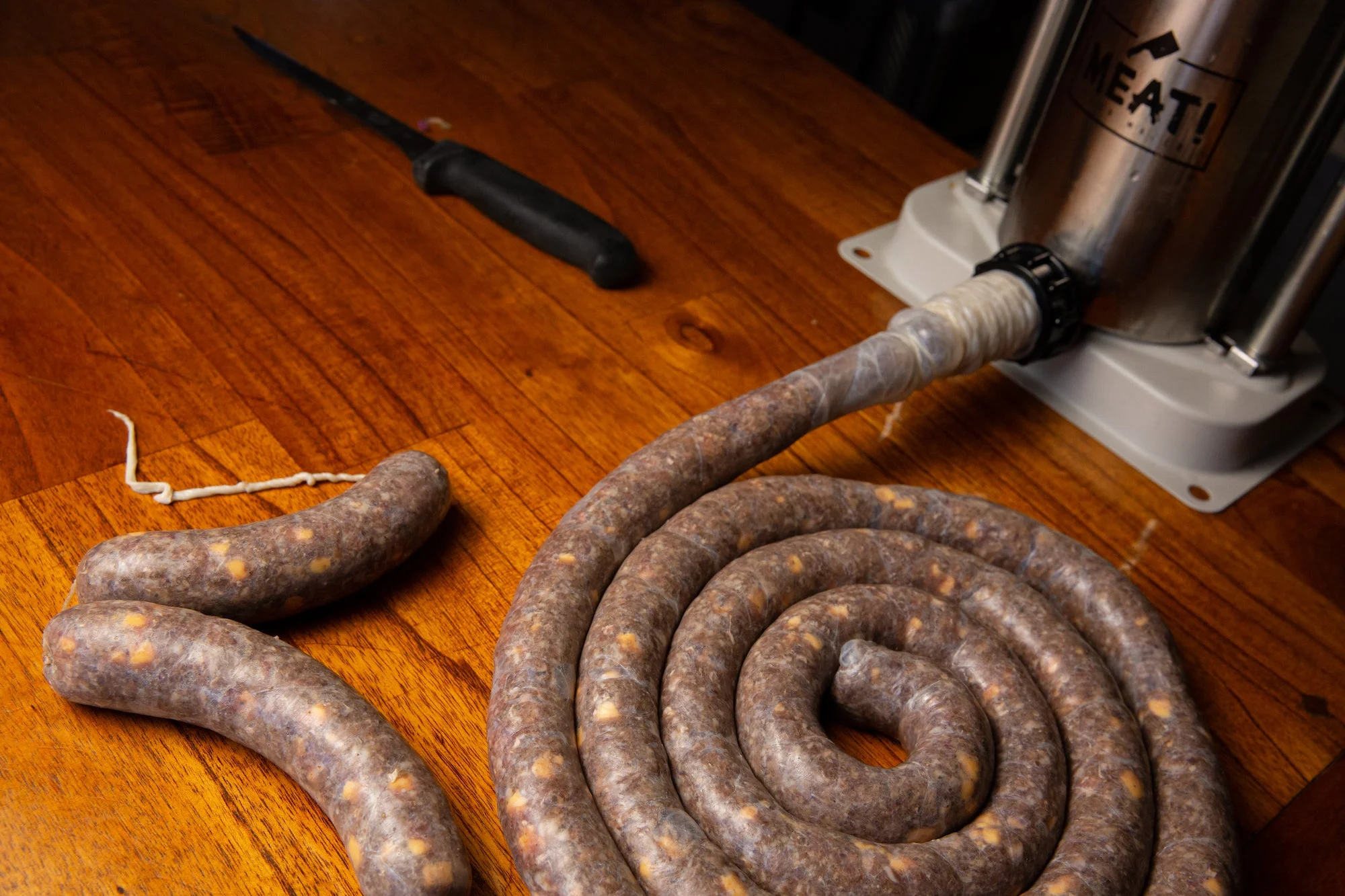
A sausage stuffer makes the job easy. Jack Hennessy
When you’re learning how to make venison sausage, it helps to have a recipe to follow. Here are the ingredients for a 5-pound batch of Italian-style venison sausage. If you’d like to adapt the recipe for different amounts of sausage, use a blend of 60 percent venison to 40 percent fat and adjust spices accordingly.
Ingredients
48 ounces of ground venison
32 ounces of pork fatback or pre-ground pork
1 cup ice-cold sherry cooking wine
10 grams of C-Bind
Natural hog casings 32-35mm
Spice Mix
2 tablespoons and 1 teaspoon kosher salt (34 grams)
1 tablespoon and 1 teaspoon fennel seeds (18.5 grams)
2 teaspoons ground black pepper (8.4 grams)
2 teaspoons dried oregano (8.4 grams)
1-1/2 teaspoons garlic powder (6.3 grams)
1-1/2 teaspoons paprika (6.3 grams)
Directions
If you plan to make linked sausage, follow the directions on the natural hog casings, which likely include thoroughly rinsing and soaking in lukewarm water one hour prior to stuffing. Before getting started you may also want to freeze the grinding plates and chute of your meat grinder an hour ahead of time to keep the meat cold.
Run very cold (perhaps partially frozen) ground venison and pork fat together through the coarse plate of the grinder. Add spices to the meat and mix for a few minutes, then run it through the grinder again, this time using the fine plate.
Add ice-cold sherry and continue to mix for another couple minutes. (If the meat starts to warm up at any point, put it in the freezer for 30 minutes.) When the sausage is mixed, you should be able to hold a golf-ball-sized ball upside down on your palm without it falling off immediately.
If you’re not making sausage links, you’re done. work into patties and freeze or cook some up in a pan. If you want to make links, continue on.
Add the meat mixture to the sausage stuffer, and secure natural hog casings to the tube (either a 30mm stuffing tube or a tube just slightly smaller than the hog casings). Leave a few inches of casings hanging off the tube untied and start cranking to let air out of the stuffer.
Once the meat starts pumping through the casing, tie the tag end of the casing with a square knot. Continue stuffing and letting out the sausage. Go slowly, and take your time. It’s better to under-stuff versus overstuff, as you can always work meat through casings afterward.
Once all of the meat is stuffed into casings, It’s time to twist the links. Links should be 6- to 8-inches long for Italian sausage, but length is ultimately up to you. Direct meat into the first link, then twist clockwise to separate it from the rest of the sausage. For the next link, on the next turn, twist counter-clockwise, and continue alternating every link to avoid undoing the previous one. Use a sausage pricker or needle to pop any air bubbles.
Hang the sausage links in a cool, dark place with as much separation as possible to allow for airflow to dry and shrink the casings. After a couple of hours, put the sausage (still linked) in a tub in the refrigerator for six to eight hours to further shrink casings and allow the meat to cool. Cut the links and either vacuum seal and re-freeze or set aside to cook soon.
Cook venison sausage links in a skillet or on a grill over medium heat. (High heat can cause natural casings to bust.) Sear all sides and finish in the oven or on a covered grill at 350 degrees F until thoroughly cooked with an internal temp of 160 degrees F.
**Read Next: The Complete Guide to Making Wild Game Sausage
**
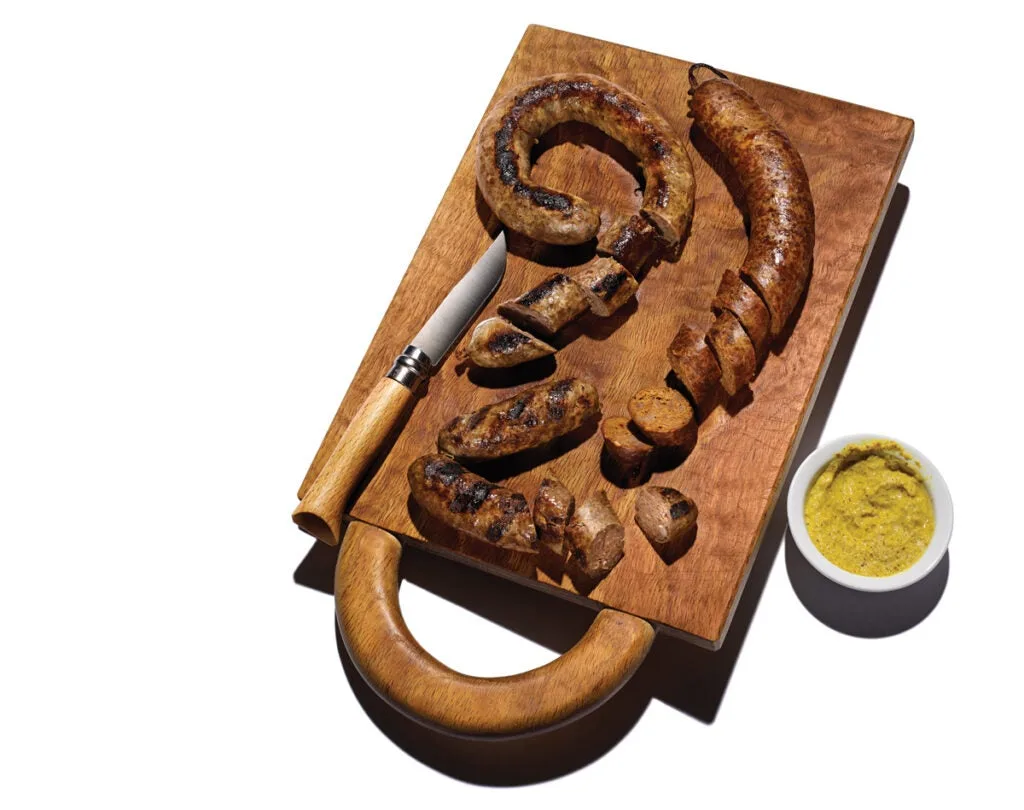
Three adventurous recipes for venison sausage: boerewors, linguica, and merguez. Plamen Petkov
2) How to Make Venison Boerewors
A South African farmer’s sausage, boerewors has a distinctive scorched-coriander flavor. This is excellent with a dab of chutney on the side.
Ingredients
2 lb. venison
1⁄2 lb. bacon
1⁄2 lb. pork fat
3 Tbsp. whole coriander seeds
1 tsp. ground allspice
1⁄2 tsp. ground cloves
1⁄2 tsp. ground nutmeg
1 Tbsp. freshly ground black pepper
4 tsp. kosher salt
1⁄2 tsp. sugar
1⁄4 cup malt vinegar
Hog casings
Directions
Toast the coriander: Place the coriander seeds in a small skillet over medium heat. Keep shaking the pan until the seeds are browning and beginning to pop; a bit of scorch is O.K., but don’t burn them. Let the seeds cool, then place them in a zip-seal bag, squeezing it to remove the air. Use a rolling pin (or anything heavy) to crush the seeds into a coarse grind.
Cut the venison, bacon, and fat into small strips or chunks. Add the remaining ingredients and combine until the meat is evenly coated. Refrigerate overnight, covered, or at least for a few hours.
Chill the sausage mixture thoroughly before grinding, for about a half hour in the freezer. Also freeze the grinder parts and the bowl you’ll be grinding into. Grind the mixture through a 1⁄4-inch die into the chilled bowl.
Knead the mixture with very clean hands to incorporate all the flavorings and to bind the meat and fat—about 2 minutes should suffice, or until your hands are too cold to continue. Refrigerate the mixture until ready to stuff.
3) How to Make Venison Linguica Sausage
Linguica is one of the culinary treasures of Portugal. It’s a coarse, rustic sausage with a vibrant Mediterranean flavor that comes from a punch of garlic and a big red dose of paprika. It’s especially tasty mixed into a plate of garlicky sauteéd greens.
Ingredients
2 lb. venison
3⁄4 lb. pork fat
4 garlic cloves, minced
4 Tbsp. paprika
1 Tbsp. dried oregano
1 tsp. ground coriander
1⁄2 tsp. brown sugar
1 tsp. freshly ground black pepper
1⁄2 tsp. crushed red pepper flakes
4 tsp. kosher salt
2 Tbsp. sherry vinegar
Hog casings
Directions
Cut the meat into small strips or chunks. Add the remaining ingredients, except the fat, and combine so the meat is thoroughly coated with the spices. Refrigerate overnight, covered.
Chill the meat in the freezer along with the fat and the grinder parts, for about 30 minutes. Grind the meat mixture through a 3⁄8- or 1⁄2-inch die. Refrigerate the meat while you grind the fat through a 1⁄4-inch die. Combine these and knead with your very clean hands for about 2 minutes, or until blended.
Stuff the mixture into rinsed casings, forming links as desired. Allow the sausages to dry on a rack in the refrigerator for several hours or overnight.
Hot-smoke the sausages until a meat thermometer poked into the middle reads 155 degrees.
4) How to Make Venison Merguez Sausage
Merguez is a fiery red lamb sausage from North Africa. Our version is a cheat, in that it uses store-bought Italian sausage (and swaps in venison for the lamb), but the recipe is adapted from one by the eminent chef Jacques Pepin—so it’s a pedigreed cheat. Lack of work, in this case, does not equal lack of flavor.
Ingredients
1 lb. venison
1 lb. hot Italian sausage
2 tsp. ground cumin
1 tsp. paprika
1⁄8 tsp. cayenne pepper
1 1⁄2 tsp. kosher salt
1 Tbsp. minced garlic
2 Tbsp. cilantro, chopped
Sheep or hog casings
Harissa, for serving (optional)
Directions
Cut the venison into small strips or chunks. Chill the venison, the grinder parts, and the mixing bowl for about 30 minutes in the freezer. Then grind the venison through a 1⁄4‑inch die and refrigerate.
Remove the Italian sausage from the casings. Discard the casings. Combine the venison and the Italian sausage filling with the cumin, -paprika, cayenne, salt, garlic, and cilantro.
Knead the mixture with your very clean hands to incorporate the spices and fully blend the meats. Refrigerate until ready to stuff.
Stuff into rinsed casings, forming links as desired. Allow the sausages to dry on a rack in the refrigerator for several hours or overnight.
These sausages are best cooked over a hot grill. As with all venison sausages, take care not to overcook. Serve with the harissa on the side.

